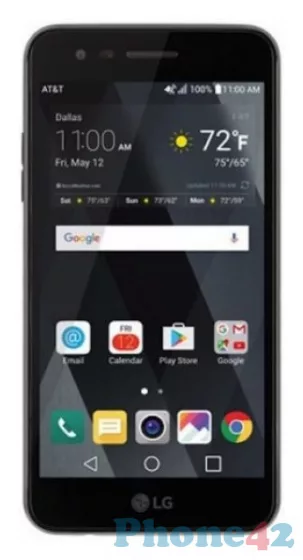
LG Phoenix 3: Pros and Cons
LG announced the launch of the Phoenix 3 smartphone in 2017. The manufacturer is offering this smartphone with 5 inch IPS display, Qualcomm Snapdragon 210 MSM8909 SoC, and 1 GB of RAM. The smartphone runs on the Android OS v6.0.1 (Marshmallow) operating system. The IPS display of this phone has wide viewing angles. It also has accurate color reproduction and better contrast and black levels. This phone has only one rear-camera (5 MP, 2592 x 1944 px, autofocus) on its back for photos and videos.
Table of Contents
- LG Phoenix 3 specifications
- Weight, dimensions, colors
- System, chipset, performance
- Display type, size, resolution
- Memory, storage
- Cameras, flash
- Connectivity, network, wireless
- Battery type, capacity, charger
- Features, sensors, specials
- Verdict, pros and cons
This article shares our personal experiences and thoughts about using the LG Phoenix 3 smartphone. We hope to offer helpful insights to others interested in this device. The specifications below are from the official manufacturer data, but we also consider user reviews. If you've seen any mistakes or things missing in these specifications, please let us know.

LG Phoenix 3 specifications
| Brand | LG |
|---|---|
| Name | Phoenix 3 |
| Model | LG-M150 |
| Release date | 2017 |
Weight, dimensions, colors
| Weight | 4.8 oz |
|---|---|
| Dimensions | 5.7 x 2.86 x 0.31 inch |
| Colors | black, gray |
| SIM type | Nano SIM |
The weight of the LG Phoenix 3 is still considered to be lightweight and portable. Smartphones use a Nano SIM as a subscriber identity module (SIM), which is a chip card.
System, chipset, performance
| OS version | Android OS v6.0.1 (Marshmallow) |
|---|---|
| SoC | Qualcomm Snapdragon 210 MSM8909 |
| CPU | Quad-core 1.3 GHz Cortex-A7 |
| GPU | Adreno 304 |
The LG Phoenix 3 comes with Android OS v6.0.1 (Marshmallow) out of the box. Google regularly releases new versions of Android. They have new features, improvements, and security updates. The quad-core mobile CPU can provide fast and efficient performance for mobile games. Smartphones, tablets, and other mobile devices use Adreno GPUs.
Display type, size, resolution
| Display type | IPS |
|---|---|
| Screen size | 5 inch |
| Resolution | 480 x 854 px |
| Multitouch support | yes |
People know IPS for its wide viewing angles. It also has accurate color reproduction. The 5 inch display make this smartphone pocket-friendly. The display size is the diagonal distance from one corner of the screen to the opposite corner.
Memory, storage
| RAM | 1 GB |
|---|---|
| Internal storage | 16 GB |
| Memory card slot | microSD |
1 GB of RAM is not typically considered to be enough for a smartphone. The needed RAM amount for good performance depends on factors. These include the OS, the apps, and the services you use. If you use your smartphone for basic tasks like calling, texting, and browsing the web, 32GB may be sufficient for your needs. You can expand the internal storage of the Phoenix 3 (16 GB) by using a compatible microSD card.
Cameras, flash
| Main camera | 5 MP, 2592 x 1944 px, autofocus |
|---|---|
| Flash | LED |
| Selfie camera | 5 MP |
You may have budget limits. Or, you may prioritize other features over a multi-camera system. If so, this single camera setup can be a good choice. The Phoenix 3 comes with a basic camera setup and lacks any advanced features.
Connectivity, network, wireless
| GSM 2G bands | 850 / 900 / 1800 / 1900 |
|---|---|
| Network coverage | 2G / 3G / 4G |
| Wi-Fi | Wi-Fi 802.11 b/g/n |
| Bluetooth | v4.1, A2DP |
| GPS | A-GPS |
| NFC | no |
| FM radio | yes |
| USB | microUSB 2.0 |
| Headphone | 3.5 mm jack |
Worldwide, people use 4G networks. They have become the standard for mobile networks in many countries. This LG phone can connect to Wi-Fi networks at home, at work, or in public places. You can use Bluetooth to connect your Phoenix 3 smartphone to many Bluetooth devices. This phone has a built-in GPS receiver. The phone isn't NFC (Near Field Communication) capable. NFC is not essential for basic phone functionality, but it can be useful. The 3.5 mm headphone jack allows you to connect wired headphones or earphones to the device.
Battery type, capacity, charger
| Type | Li-Ion 2500 mAh |
|---|
The Li-Ion 2500 mAh battery gives the smartphone a good battery backup. The Li-ion is a low maintenance battery. It does not need periodic full discharge. You can simply buy a new battery from the open market and interchange it by yourself.
Features, sensors, specials
| Sensors | accelerometer, light, proximity |
|---|
Today, smartphones come with many sensors. They help make the user experience better. The Phoenix 3 smartphone has an accelerometer. The light sensor is a type of sensor in a smartphone. It lets the phone measure light intensity around the device.
Verdict, pros and cons
Every phone has its strengths and weaknesses, and this LG phone is no exception. As with any device, there are aspects that shine and others that fall short. By examining both sides, we can paint a complete picture of what this phone has to offer. Let's explore its standout features and areas for improvement. Remember, this is just my opinion, and yours might be different.
Pros
- microSD slot
Cons
- limited-size screen
- insufficient memory
- insufficient internal storage
- single camera setup
- no OIS function
- no 5G support
- no NFC feature
- no Type-C USB port
- low-capacity battery
- no digital compass
- no fingerprint reader
Please let us know if you find incorrect information or something isn't working. Also, tell us if you have a suggestion for improvement.
 I'm Lucas Bradley, the founder of the Phone42.com site. I love technology, especially smartphones, and I've been working with tech stuff for more than 20 years. This means I've seen a lot of changes and have learned a bunch about what makes a good phone. On Phone42.com, I look at all kinds of phones. They can be from big, well-known companies or new ones trying to make their mark. I want to help people understand what's new and cool in the world of smartphones, in a way that's easy to get.
I'm Lucas Bradley, the founder of the Phone42.com site. I love technology, especially smartphones, and I've been working with tech stuff for more than 20 years. This means I've seen a lot of changes and have learned a bunch about what makes a good phone. On Phone42.com, I look at all kinds of phones. They can be from big, well-known companies or new ones trying to make their mark. I want to help people understand what's new and cool in the world of smartphones, in a way that's easy to get.